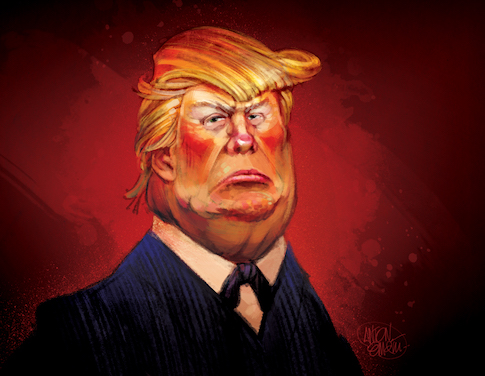From Tainted by Suspicion: The Secret Deals and Electoral Chaos of Disputed Presidential Elections (Stairway Press), available now on eBook and in bookstores in June. This excerpt looks at how an insurgent candidacy in 1824 mirrors the 2016 election cycle.
Andrew Jackson, "the friend of the common man," was the first true populist-style politician to rise to the presidency through an insurgent candidacy, or as historian Paul Johnson wrote, Jackson was "the first case, in fact, of presidential charisma in American history."
He was almost the Donald Trump of his day, though not as wealthy. He could also be compared to a class-oriented populist such as Bernie Sanders. Jackson excited the electorate with plain talk. He knew how to channel anger, anger that was largely justifiable toward an out of touch, unproductive elite in Washington. While in those days, surrogates would generally sling mud in presidential campaigns, the candidates themselves would—gentlemanly—avoid mixing it up, Jackson had no such constraints and called the banks, the War Department and Washington in general, "The Great Whore of Babylon."
"Andrew Jackson would be a very strong candidate today," said Willard Randall, an award winning journalist and historian and a professor emeritus at Champlain College. "He would deliver ripping speeches about the 2008 recessions, how the big banks were bailed out, but how the working people lost their homes. It’s the kind of thing Bernie Sanders would also say. Jackson called the National Bank the ‘hydra-headed monster.’ It’s the kind of thing Trump would say."
The Monroe presidency was called the "Era of Good Feelings," because the War of 1812 was over, the Missouri Compromise had temporarily solved the slavery debate and the country was experiencing growth and prosperity. The same party controlled the White House for six straight elections, a very good feeling for Democratic-Republicans, and Monroe wasn’t even challenged for a second term in 1820. But the country was also experiencing corruption, and the public was angry about it.
Both John Calhoun, running the War Department, and William Crawford, running Treasury—while angling to be the next president—openly accused the other of abusing their office for personal gain. Members of the administration and members of Congress allegedly accepted loans from federal contractors that they were never expected to pay back.
This presented an opportune time for a charismatic outsider to enter the fray, as Jackson called for a "general cleansing" of the nation’s capital.
Jackson perhaps had an easy target in Secretary of State John Quincy Adams. Not corrupt, but still the son of a president, the embodiment of entitlement—part of a legacy of Jefferson, Madison and Monroe, all former secretaries of state who became president as if it was the natural stepping stone.
In fact, Jackson, by contrast, was the only major candidate with no vast administrative experience in the federal bureaucracy. Whereas the other candidates were multi-lingual, Jackson only spoke English, and not the King’s English. He didn’t even write English that well. Post-George Washington, every president had held a cabinet post. But like Washington, Jackson was revered by the public for his time as a heroic general on the battlefield.
In a good bit of irony, in 1818 it was Secretary of State Adams who pressured President Monroe to support General Jackson’s undeclared war against the Spanish forces by invading Florida. … Adams even wanted Jackson to be his vice president. Adams thought Jackson’s large personality would liven up the office of the vice presidency, and "would afford an easy and dignified retirement for his old age." He also added that the vice presidency was "a station from which the General could hang no one." Supporters of an Adams-Jackson ‘24 ticket came up with a slogan. "John Quincy Adams who can write; Andrew Jackson who can fight."
The public was willing to forgive much from Jackson. He was known for a temper, engaged in brawls and killed a man in a duel for slurring his beloved Rachel.
While Madison and Monroe were mostly in the Jefferson tradition of standing for the common man, they were not of the common class. Neither was Jackson. But, he knew how to speak their language and came along at just the right time when the electorate was expanding. He was the outsider who didn’t serve his country by sitting in a comfortable office in Washington, but by risking his life in battle for the United States, very appealing at the time. Experienced politicians and writers of the day did not believe Jackson could be president. For one, it seemed unlikely he would draw cross regional appeal in New England, the South and western states. …
House Speaker Henry Clay loathed Jackson and thought him a demagogue who might very well become a dictator if he were to become president. Clay wrote: "I cannot believe that killing 2,500 Englishmen at New Orleans qualifies for the various, difficult and complicated duties of the First Magistracy."
